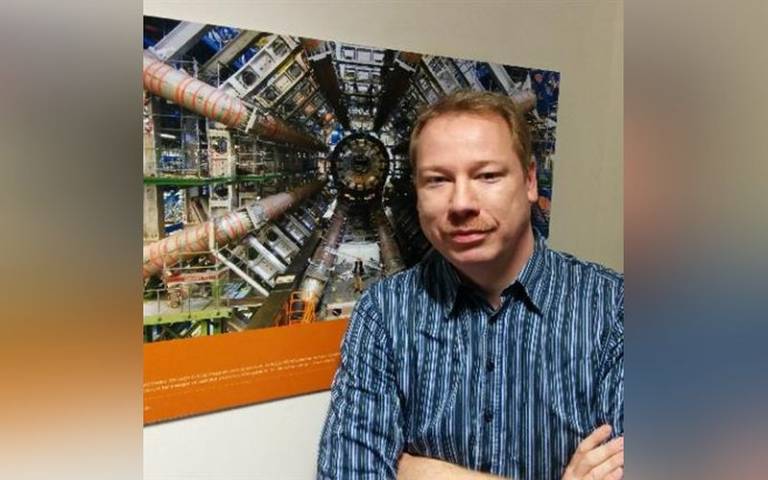Andreas Korn promoted to Professor of Physics
22 August 2022
The Cosmoparticle Initiative congratulates core staff member Andreas Korn on his promotion to Professor of Physics in October 2022

Andreas Korn started as an undergraduate in Physics at Humboldt University Berlin. He obtained a PhD in Physics at the Massachusetts Institute of Technology in 2004 and joined UCL as a lecturer and Ernest Rutherford Fellow in 2013. He is a member of the High Energy Physics Group. Prior to joining UCL, Andreas worked at Lawrence Berkeley Laboratory, the University of Oxford, and the University of Edinburgh. He is interested in fundamental research at the frontier of particle physics and the instrumentation that makes this research possible. He is currently working on the ATLAS experiment at the Large Hadron Collider (LHC) at CERN and through the Cosmoparticle Initiative has also developed an interest in the Vera C. Rubin Observatory’s Legacy Survey of Space and Time (LSST).
What brought you to Physics?
A mixture of good teachers and good books, especially one book that connected the Macrocosm of the Universe and the Microcosm of elementary particles.
What is your main research focus for the coming few years? Is there a specific challenge that you are keen to take on?
A rather exciting and pressing current question is figuring out what the nature of dark matter is. Given that ideas span from near-massless axion particles to rather massive black holes, there are many different approaches how to tackle this. As a particle physicist I have an obvious bias, but astrophysics currently holds all the hard data!
What has been the most exciting moment in your researcher’s life to date?
That is not so easy to answer. I tend to enjoy the little eureka moments when one figures something out, like the origin of a puzzling feature in the data. Big breakthroughs that one hears about on the news had many such exciting little moments before them.
You worked on several major experiments such as L3, LSST, CDF, and most recently ATLAS. What has been your favourite collaborative experience and why?
These were/are collaborations of rather different size and scope, each coming with unique, interesting opportunities as well as drawbacks.I am still amazed at the breadth of topics we cover with ATLAS, but I still perceive my first collaborative experience in L3+C as the most exciting. This was a very small satellite collaboration, making use of a larger experiment. Making decisions on the simulation, reconstruction and data acquisition framework of the experiment, by exchanging emails between two graduate students and one diploma student, was a unique experience.
Tell us more about the research teams you manage and work with, at UCL and beyond.
I work in the ATLAS collaboration, with over 3500 physicists from all over the world. We have various governing bodies that purely rely on soft power for management. For example, I am currently a member of the committee that assigns speakers for ATLAS conference talks. The postdoc and students of my UCL ATLAS research group are looking for signs of new physics in LHC collisions, we integrate within the larger UCL ATLAS and HEP group. I am also part of a multidisciplinary team within the Cosmoparticle Initiative. Together with Prof Joachimi and Cosmoparticle Initiative students, we investigate synergies between Astro and HEP methodologies in the context of the Vera C. Rubin Observatory Legacy Survey of Space and Time (LSST).
What one piece of advice would you give to aspiring physicists?
I think, on the one hand, it is great time to be an aspiring physicist. There are so many exciting questions and opportunities! On the other hand, traditional careers are becoming harder and harder to plan. My advice is to have a bit of patience and tenacity, and to look for unique opportunities. Physics is a broad and often fast-changing field with very wide-ranging applications.
Links:
Dr Andreas Korn | UCL Department of Physics and Astronomy - UCL – University College London
Collaborations: L3, LSST, ATLAS
 Close
Close

